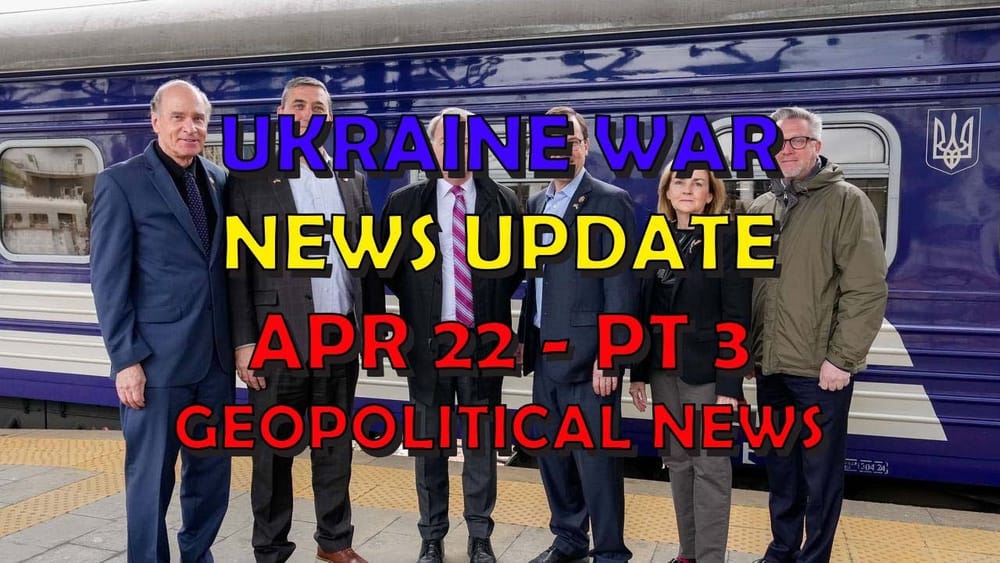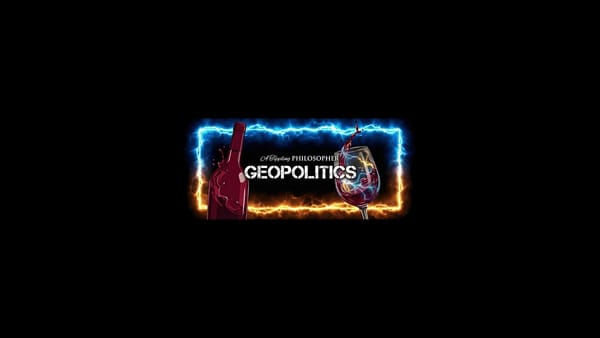Ukraine War Update NEWS: Geopolitical News
Table of Contents 📖
"If if Trump is elected, there'll be celebrations in the Kremlin. There's no doubt about it, because Putin thinks that he is an easy mark."
Hello Team
🎦 00:00-00:09⏩
Jonathan welcomes viewers to the third part of his Ukraine War Update on the 22nd of April 2024.
Return to top⤴️
Ramzan Kadyrov's Health Problems and PR Campaign
🎦 00:09-04:32⏩
Jonathan discusses reports about Chechen leader Ramzan Kadyrov's health, suggesting that a PR campaign is underway to portray him as healthy despite his ongoing illness. He notes that Kadyrov was diagnosed with pancreatic necrosis in 2019, a condition that often leads to temporary disability and skipped public events. In September 2023, Kadyrov's illness reportedly worsened, leading to hospitalization with acute pulmonary insufficiency. Jonathan suggests this was possibly caused by an overdose of tranquilizers used for pain and anxiety. There were even rumours of his death, which Jonathan reported on. He goes on to say that according to Novaya Gazeta Evropa, Kadyrov's inner circle, including Russian MP Adam Delimkhanov, were concerned about his deteriorating health. To counter these concerns, a PR campaign was launched, featuring Russian politicians, including Putin, who met with Kadyrov several times. Jonathan points to the strategic awarding of titles and orders to Kadyrov's family members as further evidence of this campaign. This includes his son, who gained notoriety for a video where he beats up a Crimean man. These actions are interpreted as an attempt to reassure the public that Chechnya is in capable hands, even if Kadyrov's health deteriorates further.
Return to top⤴️
Poland's Willingness to Host US Nuclear Weapons
🎦 04:32-05:11⏩
Jonathan reports that Polish President Andrzej Duda has stated Poland's readiness to host US nuclear weapons. Duda justifies this by highlighting Russia's militarization of the Kaliningrad region and the recent placement of nuclear weapons in Belarus. He reveals that discussions about the deployment of US nuclear weapons in Poland have been ongoing with the United States for some time.
Return to top⤴️
Hamburg Mayor Visits Kyiv
🎦 05:11-05:21⏩
Jonathan mentions the arrival of the Hamburg mayor in Kyiv, where he is scheduled to meet with Mayor Vitali Klitschko, his brother Vladimir Klitschko, and Ukrainian government representatives. Jonathan speculates that this visit might indicate upcoming support for Ukraine from Hamburg or Germany more broadly.
Return to top⤴️
US Congressional Delegation in Kyiv
🎦 05:21-05:51⏩
Jonathan reports on the arrival of a US congressional delegation in Kyiv. He mentions Tim White's involvement and speculates on the bipartisan nature of the delegation.
Return to top⤴️
Latvia Phases Out Russian Language in Schools
🎦 05:51-06:11⏩
Jonathan discusses Latvia's decision to gradually phase out Russian as a second foreign language in schools. This move is part of a broader trend in the Baltics to reduce Russian influence and strengthen national identities.
Return to top⤴️
Protests in Georgia Against "Foreign Agents" Law
🎦 06:11-06:45⏩
Jonathan reports on continuing protests in Georgia against a controversial draft law regarding "foreign agents", which many perceive as targeting media outlets and NGOs critical of the government. Jonathan expresses hope that Georgian citizens will vote strategically in the upcoming elections, considering the government's perceived alignment with Russia.
Return to top⤴️
John Bolton on Trump, Putin, and Ukraine
🎦 06:45-08:46⏩
Jonathan shares his perspective on John Bolton, acknowledging that while he might not be everyone's "cup of tea", his views on Trump's relationship with Putin and Ukraine hold weight. He points out that a significant number of Trump's former administration officials, including Bolton, do not endorse him for another term, which Jonathan believes speaks volumes about Trump's fitness for office. He plays a clip of Bolton's interview where he criticizes Trump's stance on Russia and Ukraine, highlighting the potential danger a second Trump presidency would pose to Ukraine's war effort. Bolton argues that Putin would likely view Trump's re-election as a win for Russia, given his past actions and statements. Jonathan emphasizes Bolton's experience working with Trump and witnessing his interactions with Putin firsthand, suggesting his assessment should be taken seriously.
Return to top⤴️
J.D. Vance and the "REPO Act"
🎦 08:46-11:50⏩
Jonathan criticizes US Senator J.D. Vance for his opposition to the "REPO Act", a bill that would allow the US to transfer frozen Russian assets to Ukraine. He plays a clip of Vance speaking out against the act, suggesting it's the worst part of a larger congressional package. Jonathan highlights the irony of Vance's position, given his previous attempts to halt Ukraine aid. He finds it suspicious that Vance's stance aligns with Russia's interests, raising concerns about potential Russian influence on the senator. He expresses his bewilderment at Vance's argument, as using frozen Russian assets to aid Ukraine had received widespread bipartisan support. He sees this as a worrying sign of how Russian disinformation has permeated US politics, potentially turning lawmakers like Vance into pawns in a larger geopolitical game. He further highlights the significance of this issue by mentioning that even Russian state-controlled media outlets and propagandists, like Margarita Simonyan, have expressed their approval of individuals like Vance and Marjorie Taylor Greene, who advocate for reducing support for Ukraine.
Return to top⤴️
Analysis of Mike Johnson's Handling of Ukraine Aid Bill
🎦 11:50-18:45⏩
Jonathan dissects the recent passage of a $95 billion aid bill that includes funding for Israel, Ukraine, and the Indo-Pacific region. He plays and analyzes a CNN segment featuring two strategists, a Republican and a Democrat, discussing the implications of House Speaker Mike Johnson's decision to finally allow a vote on the bill after months of delay. The Republican strategist praises Johnson for demonstrating leadership by pushing the bill through despite opposition from a "vocal minority" within the Republican caucus. She commends him for resisting pressure from Marjorie Taylor Greene, who called for his resignation over the issue. She highlights the importance of bipartisanship, and how the bill sends a strong message of unity to Russia. The Democrat strategist, while acknowledging that passing the aid package is a positive step, criticizes the significant delay orchestrated by Johnson, arguing that it should have been done months ago. She points out that this delay came at a cost, as Ukraine has suffered significant losses on the battlefield during that time. She also highlights the crucial role Democrats played in ensuring the bill's passage, emphasizing that the "heavy lifting" was done by their votes, not by Johnson's leadership. She contends that Johnson is being overly praised for simply doing the bare minimum of his job, albeit belatedly. Jonathan agrees with the Democrat strategist's assessment, arguing that while the passage of the aid bill is a positive development, it underscores the worrying trend of dysfunction within the Republican Party, where simply fulfilling basic democratic processes is now considered an act worthy of commendation. He points out that the Republican Party's internal struggles, particularly the influence of pro-Russian voices like J.D. Vance, ultimately forced Democrats to shoulder the responsibility of ensuring continued support for Ukraine.
Return to top⤴️
Anne Applebaum on the GOP and Ukraine
🎦 18:45-24:46⏩
Jonathan highlights an article by Anne Applebaum in The Atlantic where she analyses the political dynamics surrounding the passage of the latest Ukraine aid bill. Applebaum asserts that the delay in aid was a deliberate tactic by a pro-Russia faction within the Republican party, a tactic that ultimately failed. She warns that this incident demonstrates the vulnerability of US foreign policy to manipulation by foreign actors. Applebaum argues that Russia, under Putin, has been waging a psychological campaign alongside its military one, aiming to demoralize Ukraine's allies and force a premature end to the conflict. She contends that pro-Russia figures in the US, like Tucker Carlson, J.D. Vance, and David Sachs, along with online troll farms, have amplified this narrative of Ukrainian defeatism. She provides an example of how a false claim about Zelenskyy owning yachts, originating from Russian propaganda, spread through social media and ultimately influenced the thinking of some US lawmakers. She concludes by suggesting that the recent aid bill signifies a defeat for this Russian disinformation campaign. It demonstrates the resilience of US support for Ukraine, which in turn, weakens Russia's own morale. Applebaum advocates for more aggressive action against Russia, calling for a concerted effort to disrupt its sanctions evasion tactics, particularly its "shadow fleet" of tankers. She believes that greater economic pressure, coupled with continued military support for Ukraine, is crucial to ending the conflict. She highlights the success of Ukraine's unconventional warfare tactics, like drone strikes on Russian targets and the recruitment of Russian citizens to fight alongside Ukrainian forces, urging Western allies to embrace and support these initiatives. Jonathan echoes Applebaum's call for a more proactive stance against Russian disinformation. He argues that Western democracies need to develop robust strategies to counter and censor propaganda. He compares this to a military operation, where neutralizing enemy information warfare is as vital as destroying their tanks and missiles. He believes that failing to do so risks further erosion of democratic institutions and processes.
Return to top⤴️
French Company Accused of Supplying Russia
🎦 24:46-27:15⏩
Jonathan shifts focus to a report about a French company accused of continuing to supply on-board electronics for Russian aircraft, including planes used by the FSB, despite international sanctions. A former executive of the company has raised concerns about these alleged dealings and attempted to alert the authorities, including the Élysée Palace, but to no avail. Senator Cédric Perrin, chairman of the French Senate Defence Committee, has since taken up the case and passed the information to the relevant authorities, including intelligence and military agencies. Jonathan expresses his hope that these claims will be thoroughly investigated and that any breaches of sanctions are met with appropriate consequences.
Return to top⤴️
Swedish Foreign Minister Calls for Tougher EU Sanctions
🎦 27:15-28:37⏩
Jonathan reports on Swedish Foreign Minister Tobias Billström's call for tougher sanctions against Russia, specifically targeting its shadow fleet of oil tankers and imports of liquefied natural gas (LNG). Billström stresses the need to close loopholes that allow Russia to circumvent existing sanctions and highlights the importance of cutting off Russia's revenue streams. Jonathan praises Moldova for successfully weaning itself off Russian gas and encourages other larger EU member states to follow suit.
Return to top⤴️
Correction on Biden-Trump Polling
🎦 28:37-36:17⏩
Jonathan acknowledges a correction from a previous video where he stated that polls show Biden ahead of Trump in the 2024 presidential race. He clarifies that while some polls do show Biden leading, the overall picture is more complex. He states that while he personally believes Biden is on track to win, acknowledging factors like Trump's legal troubles and the improving US economy under Biden, it's too early to make definitive predictions. He emphasizes the importance of looking at polling trends and averages rather than focusing on individual polls. He clarifies that the race has tightened, with many polls now showing a statistical tie between Biden and Trump. He cites various pollsters and their methodologies, highlighting the complexities of interpreting polling data. He emphasizes the significance of the upcoming election for Ukraine, expressing his hope for a Democratic trifecta (control of the Presidency, House, and Senate) to ensure continued and unwavering US support for Ukraine. He believes this is the best-case scenario to counter pro-Russian sentiment within the Republican Party and to provide Ukraine with the long-term support it needs to achieve victory.
Return to top⤴️
Wrap up
🎦 36:17-36:20⏩
Jonathan thanks his viewers for watching and says goodbye.
Return to top⤴️



